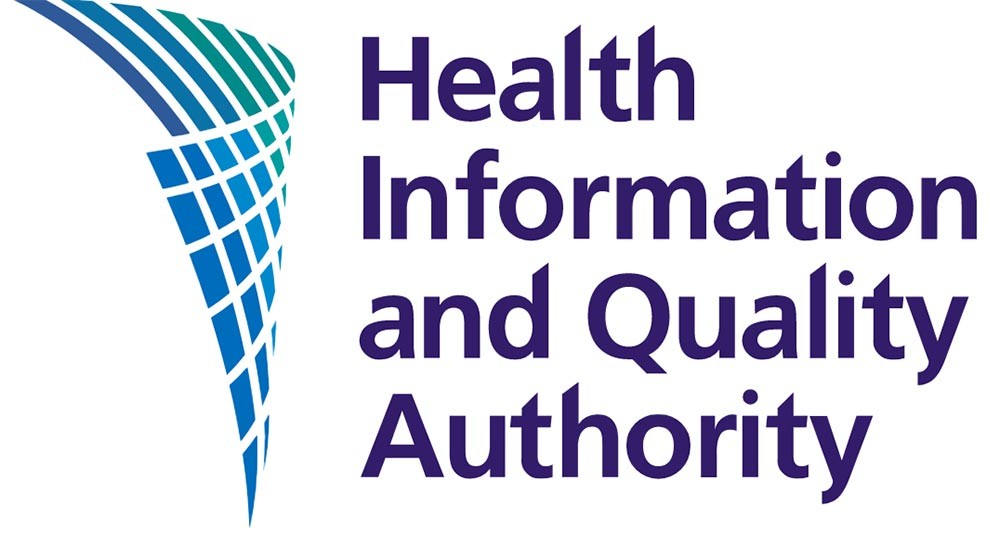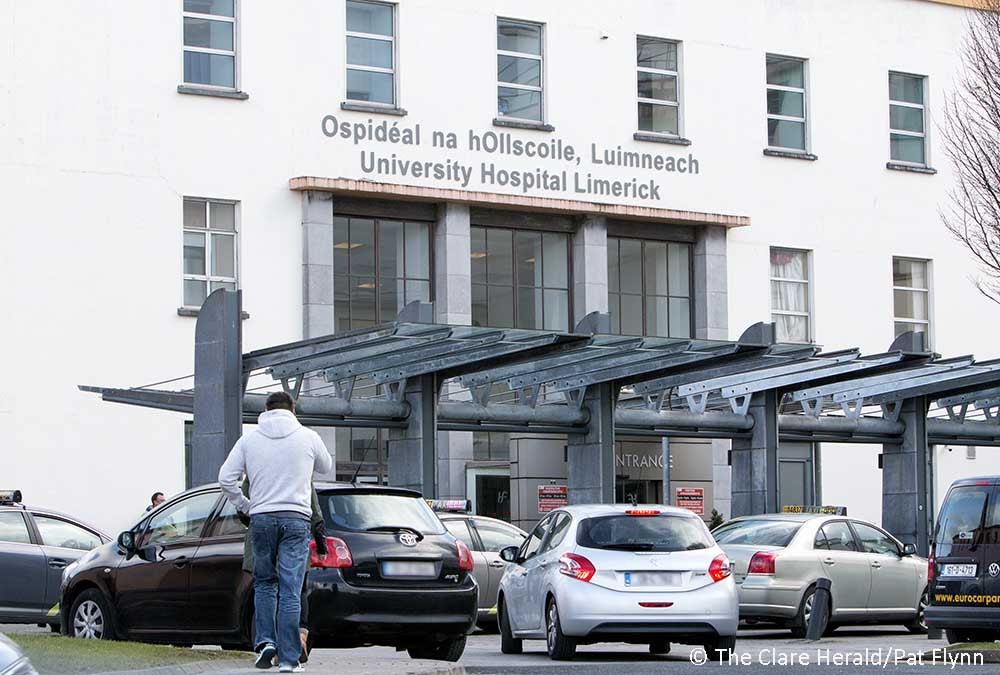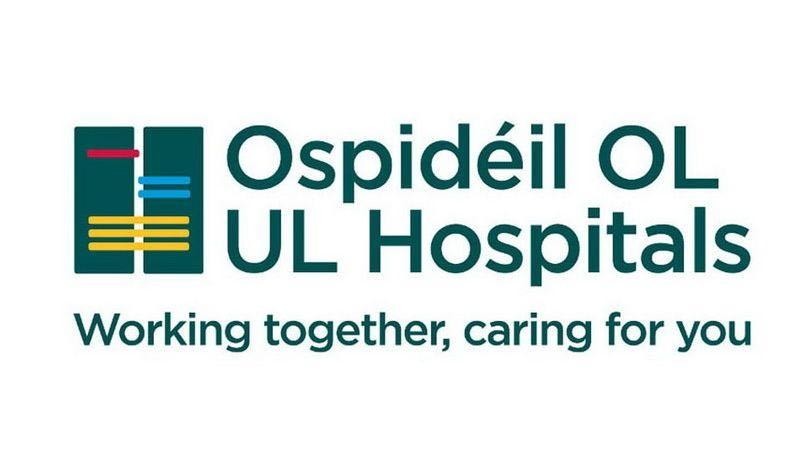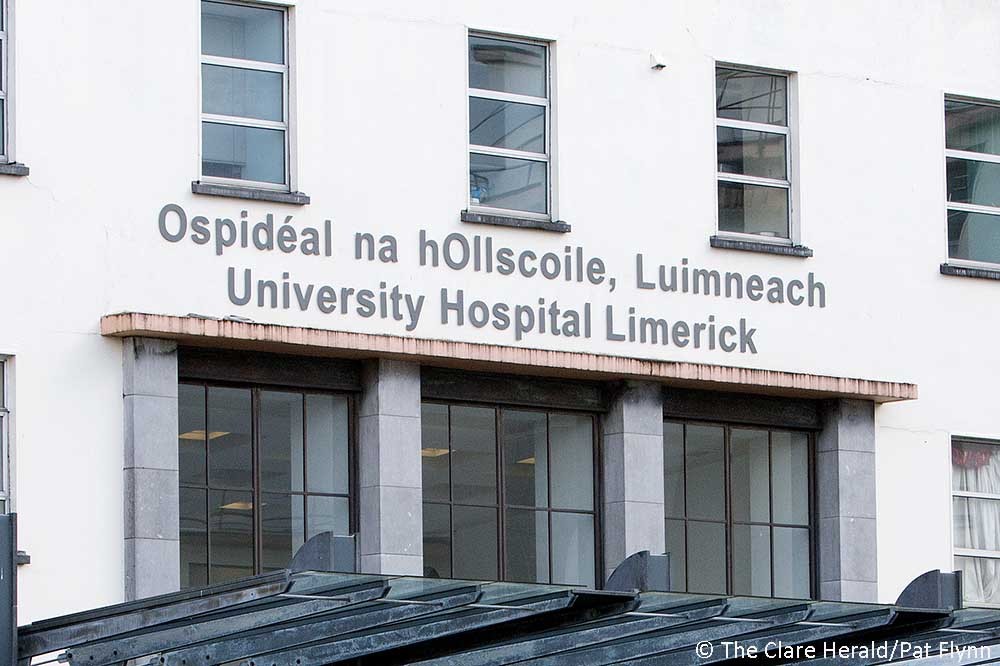Update:
Senator Martin Conway, who is the Fine Gael Seanad Health spokesperson, has written to the Chair of the Oireachtas Health Committee recommending that UL Hospitals Group management are invited before the Committee at the earliest possibly opportunity.
Senator Conway said, “The HIQA report raises some very serious concerns about patient safety at University Hospital Limerick.
“It is important that the Oireachtas Health Committee investigates this matter as soon as possible and so, I have asked the Chair of the Committee to invite UL Hospitals Group management to appear before the Committee at the earliest possibly opportunity.
“I hope we have swift acceptance of such an invite so we can urgently examine the concerns in the HIQA report and receive an update from UL Hospitals Group on the plan to address them,” concluded Senator Conway.

UL Hospitals Group has issued a statement following today’s HIQA report into an unannounced inspection of University Hospital Limerick earlier this year.
The Health Information and Quality Authority (HIQA) raised serious concerns about patient safety, as a result of overcrowding at UHL, the main hospital in the midwest.
The authority said conditions at the Emergency Department at UHL are insufficient to meet the needs of patients and that they compromise the delivery of safe care.
The Authority has published a report on the ED, following an unannounced inspection there, earlier this year.
It details how the hospital is failing to comply with national standards governing patient dignity, patient care and staffing levels. In addition, UHL is only partially compliant with guidelines for the effective management of services.
The report said inspectors were not assured the hospital had adequate measures in place to address overcrowding, ineffective patient flow, insufficient nurse staffing levels and prolonged ED wait times.
And it concluded that measures enacted to try and tackle these problems to date, have not been effective in managing risks to patient safety.
The inspection took place on 15 March, days ahead of the St Patrick’s weekend double bank holiday.

In a statement this morning, UL Hospitals Group said: “We acknowledge the findings of the HIQA Report. Our plan to bring our service in the Emergency Department closer to compliance with the national standards is included in the report. We have developed a detailed plan with actions to be taken within three months, six months and three years.
Its success will depend, among other factors, on improvements in internal processes; additional patient flow pathways and hospital avoidance initiatives; closer integration with community services as set out in Slaintecare; and resourcing the heath service in the MidWest, including acute bed capacity, in line with the size and the health needs of the population it serves.
Among the short-term actions we are taking are the following:
Additional staff redeployment to the Emergency Department and triage
Review of our escalation plans
Ongoing focus on patient transfers to Ennis, Nenagh and St John’s hospitals
Further development of hospital avoidance programmes with our colleagues in HSE Midwest Community Healthcare
Enhanced opportunities to increase patient access to community health services
As announced by the Minister for Health on April 27th, we are currently working with a team of HSE experts on unscheduled care and ED management. This HSE support team has also been engaging with colleagues in HSE MidWest Community Healthcare. We await the team’s report to include additional measures to improve patient streaming and hospital avoidance. This action plan will be a means of mitigating the risks to patient safety and addressing poor patient experiences in our ED, as highlighted by HIQA.
In addition, the CEO of UL Hospitals Group has commissioned Deloitte to conduct an external review of patient flow at University Hospital Limerick. This review is intended to provide an independent and comprehensive overview of patient flow through the ED at UHL while at the same time looking at the use of resources, processes in place and identifying any constraints. Our community and GP colleagues in the MidWest are also being consulted as part of this review and the final report from Deloitte is expected in the coming weeks.
The scale of the challenge faced by the only Emergency Department in the MidWest must not be underestimated. In 2021, the ED at UHL saw a record 76,473 attendances, an increase of 17% on the previous year. In the first four months of this year, we have seen a further 26,548 ED attendances, an increase of another 20% on the corresponding period for 2021. The number of over 75s attending our ED has risen by an even greater proportion.
Patients have been attending the ED in record numbers over the last 15 months and it is essential that seriously ill or injured patients who require emergency care continue to do so. Injury units, GP, GP out-of-hours and pharmacy services are all available as alternatives to the ED and we encourage members of the public to consider these options before attending our ED.

We apologise to all patients for the long waits and poor care environment being experienced in our Emergency Department. This also adversely impacts on staff and it is encouraging to see the professionalism and kindness of staff, in the words of our patients, acknowledged in the HIQA Report.
The longstanding efforts of local management and staff, and of the HSE nationally, to alleviate pressure on the ED through adding capacity, resources and providing alternatives also need to be acknowledged.
These include:
Increased activity in our Injury Units with an annual growth in attendances (YTD April 30th) of 68% at Nenagh Injury Unit so far this year and 27% at Ennis Injury Unit. In April 2022, Nenagh Injury Unit had its busiest month to date and Ennis, its second busiest.
Attendances at our Medical Assessment Units in Ennis and Nenagh grew by a combined 19% between 2019 and 2021. In the first five months of this year they have seen a further annual increase of 17% combined
An increase in staff of 37% across UL Hospitals Group since December 2019
An increase in bed capacity at UHL of 98 inpatient beds and 10 critical care beds since the start of the pandemic
More patients receiving care than ever before at UHL with an increase of 24% in inpatient discharges between 2019 and 2021 and a further year-on-year increase of 12% in the first quarter of this year
We are also working with colleagues in HSE Mid West Community Healthcare on integrated care pathways and hospital avoidance, including initiatives focused on older people living with frailty. These include:
Integrated Care Programme for Older Persons (ICPOP) is a Community-based specialist service that provides rapid access to a multidisciplinary-delivered comprehensive geriatric assessment (CGA) for older adults living with frailty or at risk of developing frailty. To date this year, ICPOP teams in Clare, Limerick and North Tipperary have received approximately 400 referrals and completed approximately 3,000 assessments and interventions.
Almost 6,000 radiology tests completed up to the end of April 2022 under the direct GP access Community Diagnostics Programme.
Community Intervention Teams (CIT) based in Clare, Limerick and North Tipperary focus on hospital avoidance and early supported discharge to the person’s home.
Triage times:
ED triage times at University Hospital Limerick are monitored and reported nationally. We acknowledge and regret the unacceptable times identified by HIQA in its report.
An escalation plan has been put in place to address ED triage times, which initially involved the redeployment of senior ED nurse managers to respond to waiting times. Five additional nurses have been trained in the Manchester Triage System since the visit, bringing to 47 the number of ED staff now trained to triage patients. A plan is in place to train additional staff as they acquire the necessary experience to complete the training.
Nursing staffing:
We continuously recruit new nurses to our Emergency Department. Of the 286 WTE (whole-time equivalent) staff nurses recruited to UHL since July 2021, 39 have been recruited to the Emergency Department. The current nursing staffing deficit in the ED is 14 whole-time equivalents (WTE), of whom two are permanent vacancies awaiting interview and the remainder are temporary vacancies (maternity leave, career break etc) which may be filled by agency and overtime.
There were three short-term notified Covid-19-related absences specific to ED on the day of the HIQA inspection. This brought to six the number of nursing deficits on the roster that day. Two nurses were redeployed into the department. Staff absences across the site related to Covid 19 limited further opportunities for redeployment to ED, as a number of surge areas requiring nursing staff were also open across the hospital.
We welcome the recent publication by the Minister for Health of the Framework for Safe Nurse Staffing And Skill Mix in Adult Emergency Care Settings. The Chief Director of Nursing and Midwifery in UL Hospitals Group has made a submission to the HSE for UHL to be the first hospital in the country for the implementation of the framework. She has made a further submission to the HSE seeking funding to apply the framework, as it relates to nurse staffing in medical and surgical wards, to admitted patients waiting in our ED. Implementation of the framework would see a significant improvement in nurse staffing levels and patient experience in our ED.
Prof Brian Lenehan, Chief Clinical Director, UL Hospitals Group said: “We have closely examined the findings of the HIQA Report and we are working with HIQA and with the HSE on short, medium and long-term plans to improve the experience of patients in our ED. We acknowledge that the measures in our escalation plan are not sufficient to meet the unprecedented increase in demand on our service. This is not for want of effort or commitment on the part of management and staff. While we are committed to taking the actions we can to bring about improvement, we hope that publication of this report today results in a wider acknowledgement that many of the solutions to this persistent problem in Limerick are to be found outside of the Emergency Department and outside of the hospital.
“The MidWest and UHL has many unique challenges. We have fewer inpatient beds and fewer consultants and NCHDs to provide care than comparable hospitals. We serve a region with a higher frailty index and a city with a higher deprivation index. Over the course of the pandemic, our ED did not see the scale of reduction in presentations seen around the country and the growth in demand on our hospital since has also been disproportionate and exceptional. The volume of self-referrals to our ED as outlined in the HIQA report is higher than elsewhere. People of the MidWest have fewer alternatives than elsewhere when it comes to accessing emergency care. We look forward to the fulfilment of the promise of Slaintecare that healthcare resources will be distributed more equitably in future in line with population need. The case for an acceleration of Slaintecare in the MidWest is obvious,” Prof Lenehan said.
“I would like to apologise to each and every patient who faces excessive wait times in our ED. It is essential that people who need it continue to attend our Emergency Department.”
“We are committed to working with all stakeholders on improving our processes and how we work to meet this challenge. We acknowledge the significant investment we have received in recent years in improving our infrastructure. Lack of bed capacity remains our primary constraint and we hope that publication of this report today redoubles the efforts of all to ensure that the MidWest catches up with the rest of the country in terms of bed numbers and staffing resources,” Prof Lenehan said.
